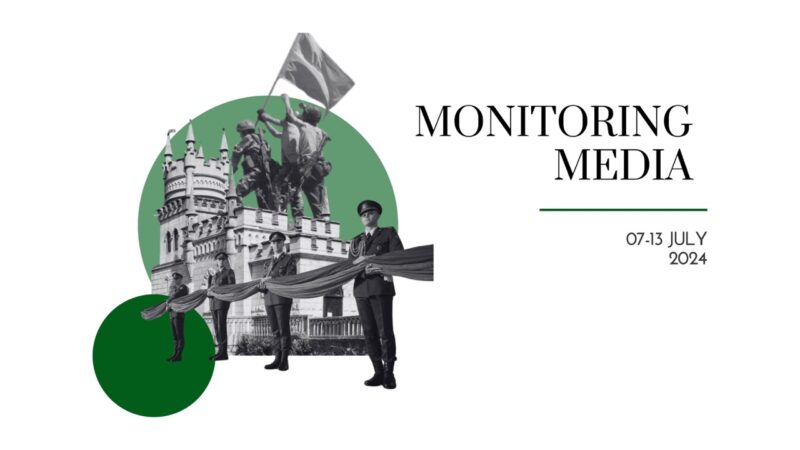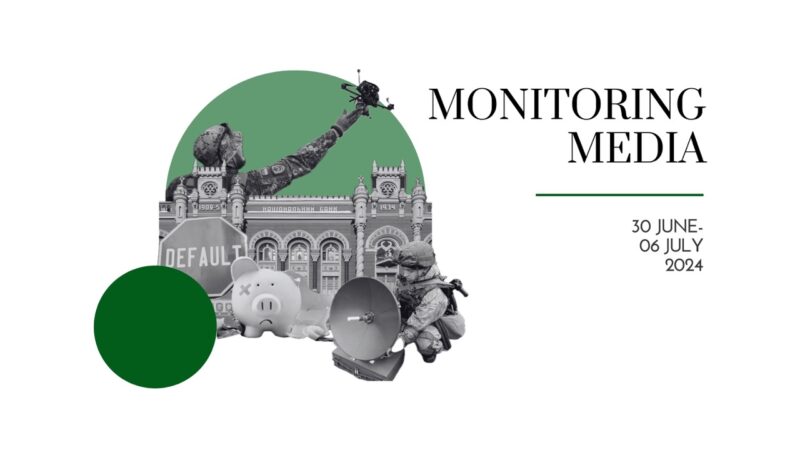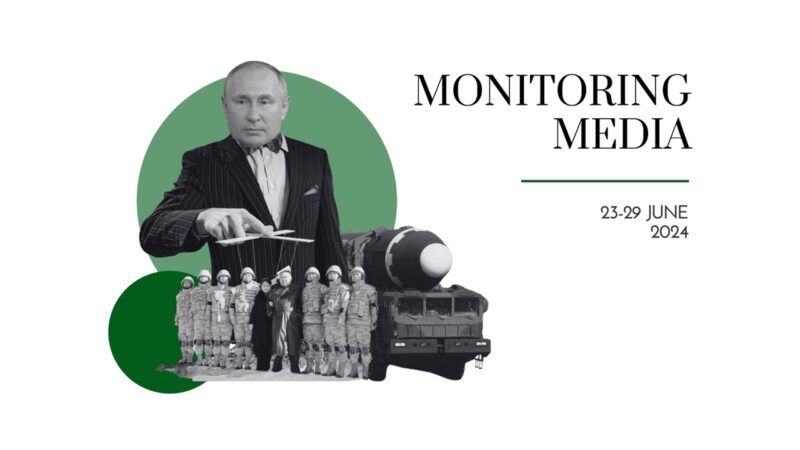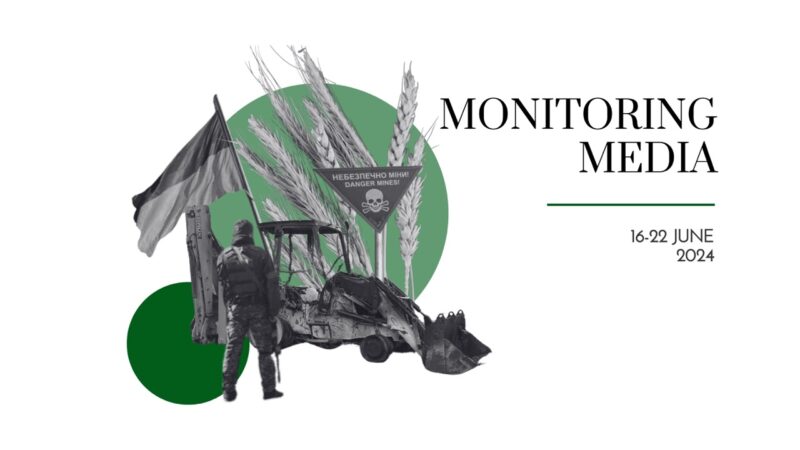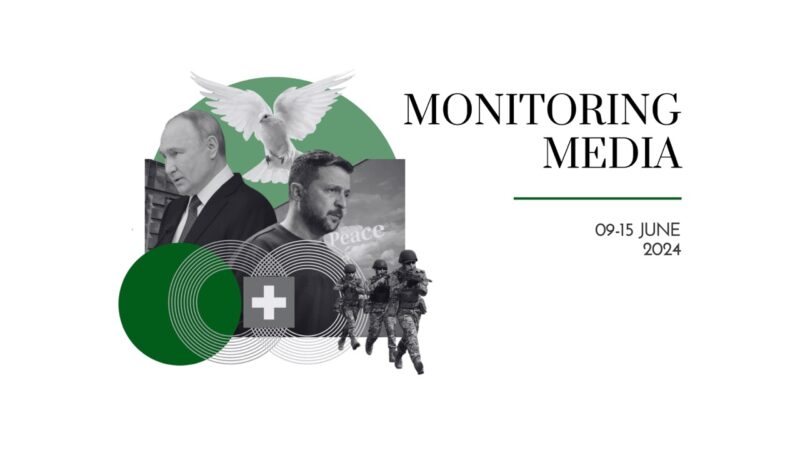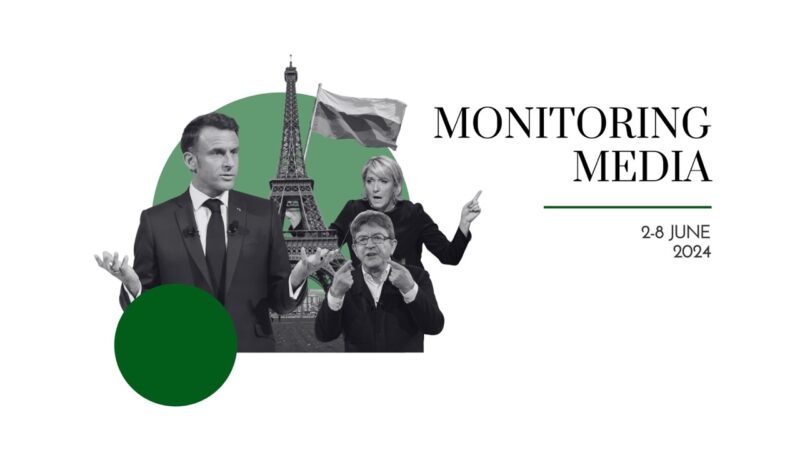Russia’s Victory Day tarnished by Ukraine’s successes in Donbas

CIUS weekly report on media coverage of Ukrainian affairs, 09–15 May 2022
Three North American magazines (The Economist, Wall Street Journal and The National Interest) were selected to prepare a report on how the war in Ukraine has been portrayed in the media during the past week (09–15 May 2022). The sample of magazines was created based on their impact on public opinion, as well as their professional reputation, popularity among the readership, and topical relevance. The three magazines represent the centrist, liberal, and conservative political spectrum.
This report covers only the most-read articles about Ukraine as ranked by the respective magazines themselves in the past week. Also, this report covers texts from the home pages promoted by editorial boards, texts from special sections on Ukraine, major opinion-forming texts, and texts from paper versions of the magazines.
Topics featured in the publications
- Ukraine at war: successes in the military counter-offensive, difficulties in defending the Donbas, the war’s toll on the national economy and fates of Ukrainian refugees;
- the world at war: scenarios of NATO enlargement in Northern Europe, evolution of trans-Atlantic digital security cooperation, reinforcement of the US global stance;
- Russia at war: less pomp in the 2022 Victory Parade in Moscow, Russia’s desire to change the global nuclear order, the war’s toll on the Russian economy, politics, and academia.
The most common arguments
Ukraine went on a counter-offensive to disrupt the logistics of invading troops. Yaroslav Trofimov and Mauro Orru (Wall Street Journal) offer a quick summary of events in the past week with a focus on Ukraine. They address Washington’s increased support to Ukraine, the supply of weaponry from the West, the importance of artillery in the ongoing war, Russian tactical failures, and Ukraine’s “smart battle management.” The specific focus is placed on Ukraine’s successful counter-offensives in the northern and eastern parts of the country.
Ukraine wages hard negotiations to save its soldiers from Azovstal. James Marson and Laurence Norman (Wall Street Journal) mention that Ukraine and its partners apply extraordinary efforts to make possible the evacuation of Ukraine’s soldiers trapped in the besieged Azovstal steel plant in Mariupol. Marson and Norman outline factors that facilitate and complicate the evacuation: US and German pressure on Russia to agree on a cease-fire, engagement of international organisations (the UN and the Red Cross) in the negotiation process, promises of the EU and G7’s military and financial support to Ukraine, the position of Russia that insists on disarming Ukrainian defenders before evacuation, the trial of Russian war criminals in Ukraine, and others.
Ukrainian civilians endure dire conditions during the Battle for the Donbas. Yaroslav Trofimov ( Wall Street Journal) writes that Sievierodonetsk, one of two major cities under Ukraine’s control in Luhansk oblast, became the epicentre of war: “With no power, water, cell phone coverage or access to news, the remaining residents in this regional Donbas city are sheltering in basements, hoping to survive.” Trofimov mentions that heavy fights in the suburbs of Sievierodonetsk make the front lines change rapidly, as well as highlights the symbolic importance of the city: it has served as the Luhansk oblast capital since the occupation of Luhansk city in 2014. Finally, Trofimov emphasizes that the restoration of damaged infrastructure is hardly possible as many of the qualified specialists fled Sievierodonetsk.
The Chornobyl Nuclear Power Plant bodes a new catastrophe under Russian occupation. Wendell Steavenson with Marta Rodionova (The Economist) provides a day-by-day report on events from Chornobyl on the ground, after Russians entered the facility. This report includes short interviews with the plant’s employees who interacted with occupying soldiers. The latter seemed to have little idea of their whereabouts—they eagerly looted lab equipment and ignored the presence of radioactive waste. Instead, the employees did their best to contain the destructive impulses of Russians, sometimes at risk of losing their lives, and prevent a new technogenic catastrophe.
Ukraine’s economy will sustain unparalleled damage from the war, especially sea trade. In his interview with The Economist, Serhiy Marchenko, Ukraine’s finance minister, highlights that the national economy demonstrated sufficient resilience in the first months of the war. That being said, the national GPD is predicted to shrink by over 40% in 2022 which requires issuing war bonds and asking for support from foreign governments and the IMF. The minister’s major fear is that Ukraine’s “fairly market-driven, freewheeling economy might see a wave of nationalisations, undoing years of hard-fought progress.” The situation is worsened by the Russian blockade of the Black sea ports, which makes grain exports very problematic.
Post-war Ukraine may become a model libertarian state. Rainer Zitelmann (The National Interest) provides insight into the panels of the Europe Liberty Forum (12–13 May 2022) where “no one from Ukraine discussed how the war might end, instead, they focused solely on the opportunities that will arise after victory.” One of the major incentives voiced during the Forum was to preserve wartime economic liberties, regulatory opt-outs, and bureaucratic simplifications for the future. This will make the business environment freer and, therefore, more attractive. Zitelmann finds such incentives feasible considering the close connections of the libertarian think-tanks to the government.
Volodymyr Zelensky grew from a movie star to a real president. James Hookway (Wall Street Journal) writes an analytic biographical note of Ukraine’s sixth president. In this note, Hookway highlights that Zelensky never had any traditional political experience before taking the highest post. He entered policymaking from the show business field. This may be the reason why Zelensky underestimated the probability of the Russian military invasion before 24 February 2022. However, following the invasion he became a proper war-time leader and an outstanding orator of the modern age. Not least thanks to his personal fortitude and quality of public addresses, Ukraine remains high on the world’s agenda, as well as continues receiving financial and military aid.
Millions of Ukrainian refugees are being warmly received in numerous host countries. Joanna Sugden (Wall Street Journal) claims that “more than six million people have fled the war in Ukraine since Russian President Vladimir Putin began his onslaught on the country…14 million have been forced from their homes by the war.” Russia’s invasion of Ukraine triggered the largest movement of people in Europe since WW2 with no end to this process in sight. The majority of refugees, around 3.2 million people, entered Poland in the first 80 days of the war where a proper infrastructure had been created to support them. Around 1.6 million refugees have already returned to Ukraine.
The UK supports applications of Finland and Sweden to NATO. The Economist interviews Boris Johnson, the British prime minister, on the repercussions of the Russo-Ukrainian war. Johnson argues that the war signified the beginning of a new era in the European security landscape. Finland decided to abandon its Cold War neutrality and Sweden its 200-years long strategy of avoiding conflicts. The UK has already signed the declaration of wartime assistance to both states, as well as will support their accession to NATO. Speaking of Ukraine, Johnson seems to advocate the Western “doctrine of deterrence by denial”: “even without invoking the question of nato membership, Ukraine [should be] given nato-compatible weaponry, training and intelligence sharing of such quality and quantity that no one will ever invade Ukraine again.”
Yaroslav Trofimov and Mauro Orru (The Wall Street Journal) scrutinise the importance of the last call of Finland’s President Sauli Niinistö to Vladimir Putin. During that call, Niinistö informed his counterpart that Finland would apply for NATO membership. Both presidents avoided aggravation.
The war in Ukraine may spread to Northern Europe. Mark Episkopos (The National Interest) highlights that Finland’s NATO membership will bring the alliance “closer than ever to Russia’s doorstep, auguring an escalation of the Russia-West conflict from a proxy war in Ukraine to a broader European confrontation with unpredictable and potentially catastrophic consequences.” Episkopos warns that Russia, backed into the corner by NATO enlargement, will become more likely to boost its military presence, including deployment of nuclear weapons, in the Nordic region. At least, this may be deduced from the Kremlin’s statement of “retaliatory steps” in case Russia’s Nordic neighbours join NATO.
The war in Ukraine has strengthened Transatlantic trade and technological ties. Daniel Michaels and Yuka Hayashi (Wall Street Journal) alongside the analysts from The Economist write about the creation of the U.S.-EU Trade and Technology Council (TTC) and the tasks that lie ahead of it. In particular, these tasks anticipate harmonisation of the “financial regulations, export-control regimes and foreign-investment rules.” A unified Transatlantic response is needed to maintain efficient sanctions against Russia, counteract Russian attacks in cyber-space, improve the protection of private information, and curtail the Chinese “increasingly autocratic technosphere.” The TTC intends to engage “friendly Asia-Pacific nations” in its activities in the future.
War in Ukraine has accelerated a geopolitical power shift from the West to China. Zhou Bo (The Economist) argues that China stands neither with Russia nor the West in the war in Ukraine. Such poignant neutrality is nevertheless a better choice than clear support to one of the colliding sides. Zhou Bo also introduces the concept of “the Sino-Russian non-alliance” that makes two states partners in redesigning the West-centred world order, but no more: “in spite of the fact that China and Russia both call for a multipolar world, a non-alliance suits them because they see such a world differently.” Zhou Bo also warns that NATO’s enlargement to Finland and Sweden will make the alliance less integral, yet more targeted by the Kremlin. In this light, the geopolitical pole of power will shift to the East making China the global stabiliser.
The war in Ukraine may reinforce the global status of the US. Unlike Zhou Bo, Thomas S. Kaplan and Bernard-Henri Lévy (Wall Street Journal) argue that Washington should perceive developments in Ukraine as “a historic chance to turn back years of retreat and reassert the leadership that seemed to have been lost forever.” To do so, the US should supply weaponry and empower “those who are willing to bear the burden of fighting for interests and values they share with all Americans,” in particular Ukrainians and Kurds. Both peoples stand against formidable foes who are Russia and ISIS. The consent among Republicans and Democrats to support these people should be used to its fullest. In this light, Natalie Andrews (The Wall Street Journal) adds that the US $40 billion aid package to Ukraine is an efficient move to sustain the state and the nation.
Israel’s policy toward Ukraine is based on its own security interests. Chuck Freilich (The National Interest) argues that in light of Jewish history, “Israel can and should do more to assist Ukraine, but like all states, its foremost moral commitment must be to its own security.” Being squeezed into the US-Russia-China triangle of power, Israel has limited space for manoeuvring. Therefore, similarly to Georgia, Israeli people come out in favour of Ukraine, yet the government exercisers caution.
Turkey’s policies toward Ukraine are based on pragmatism. Harun Karčić (The National Interest) highlights that “Turkey has been mostly convergent with its NATO allies in supporting Ukraine…it also closed the Bosporus to Russian military vessels and its airspace to Russian jets…However, it refrained from imposing sanctions on Russia.” This selectivity allows Turkey to guarantee its own security, also in the economic dimension, and serve as a middle ground for Russian-Ukrainian negotiations.
The Victory Day on 9 May demonstrated uncertainty in Russia. The political symbolism of the Victory and the modesty of its celebration in 2022 was actively discussed in all magazines in the past week.
Ann M. Simmons (The Wall Street Journal) explains the importance of Victory Day for Russians calling it “the country’s most important secular holiday” and “a historical touchstone for millions” of people. Simmons also highlights that Putin’s speech this year was relatively humble. Contrary to predictions, the President “neither declared victory in Ukraine nor ordered a mass mobilization.”
The Economist concludes that the events in Ukraine spoiled the Russian Victory Parade this year. This is because the Russian army failed to achieve its objectives on the ground and Zelensky rallies the world’s solidarity and support around his cause. Putin’s Russia is being strategically defeated on a battlefield and in international relations.
Another article by The Economist argues that Victory Parades are a litmus paper of Russian power. The more flamboyant they are, the more confident the Kremlin stands in its domestic and international policies. This year, “the parade was more notable for its absences and omissions than for its pageantry.” Russia is being hit by the consequences of probably “the biggest military blunder in its history.” That said, Putin gets the state ready for a protracted war.
In another article Ann M. Simmons (Wall Street Journal) describes how Putin used the Victory Day to justify the invasion of Ukraine: “the Russian leader said Moscow had been forced to act because it believed that a clash with Ukraine, which he says is led by U.S.-backed neo-Nazis, was inevitable.” All Putin’s messages were framed to reach the domestic audience only.
Putin changes the logic of global nuclear deterrence. Gerald F. Seib (Wall Street Journal) writes that Putin unleashed dangerous “nuclear genies”: “the risk of nuclear war itself, the return of nuclear blackmail as a tool of statecraft and the emergence of new incentives for other nations to acquire nuclear arms.” These three will significantly influence discussions on security architectures for years to come.
Russia may not bluff when speaking of the nuclear attack on the West. Barry R. Posen (The National Interest) states that “politically and militarily, the United States is deeply engaged in Ukraine’s war effort…Yet, the administration still seems to think that Russian escalation is unlikely.” The latter escalation may come as a response to Western engagement in the war and may envision “the ‘tactical’ use of nuclear weapons to achieve battlefield effects” if the Kremlin finds it reasonable.
Russia is on track for a record trade surplus in 2022. The Economist points to the paradox that though “Russia’s financial system seemed on the verge of collapse” in the first days following the invasion, “the country still generates about $1bn a day from its energy exports.” The Economist posits that “in 2022 the current-account surplus…could come in at $250bn (15% of last year’s gdp), more than double the $120bn recorded in 2021.” The conclusion is made that the Western sanctions against Russia reached their limits and are counterproductive today.
Russian academia should not be sanctioned by the West. Matthew Rendall (The National Interest) argues that “it is vital to keep channels open to Russian journalists and scholars…it offers a chance of eventually persuading Russians that their country is on the wrong course.” Otherwise “Russia could be left like Germany at the end of World War I: defeated but embittered.” Rendall highlights that cutting ties with Russian academia puts the biggest strain on honest researchers, imposes feelings of undeserved victim-hood, and, consequently, nurtures hatred towards the West. Sanctions against academia do not contribute to the resolution of the war.
Worth your attention
NATO is neither expanding into nor waging a proxy war in Ukraine. Mark Episkopos (The National Interest) writes the following: “Moscow launched the Russian invasion of Ukraine, in part, out of concern over NATO’s creeping eastward expansion since the end of the Cold War. The alliance may soon be closer than ever to Russia’s doorstep, auguring an escalation of the Russia-West conflict from a proxy war in Ukraine to a broader European confrontation with unpredictable and potentially catastrophic consequences.”
Mark Episkopos, the same as Zhou Bo (The Economist), uses the Russia-promoted term expansion with respect to NATO, which is misleading. The expansion term challenges the actorness of the NATO members. In this light, these are not sovereign states who formed the Alliance for their protection but the Alliance that self-purposively “expanded” to incorporate sovereign states. It is advised to use the term enlargement with respect to NATO, which also reflects the Alliance’s own wording. For better insight, consider reading the article by Daniel Ramallo (The National Interest).
NATO’s enlargement as the casus belli for Russia has many weak points in it. To begin with, the Alliance is a defensive, not an offensive organization. It has never aimed to threaten Russia; quite the opposite, Russia has actually developed a unique institutional framework of cooperation with NATO. The Alliance exists for providing security to territorially small European states who have always recognised Russian military prowess. For more details, consider reading the publication by Hans Petter Midttun (Euromaidan Press).
Episkopos argues that the ongoing war in Ukraine is a proxy war between the Western actors and Russia. Cambridge Dictionary defines the proxy war as “a war fought between groups or smaller countries that each represent the interests of other larger powers, and may have help and support from these.” In light of this definition, the war in Ukraine is not a proxy war. It started on 23 February 2014 after Russia occupied Ukraine’s Autonomous Republic of Crimea. The Western actors experienced no damage or loss at that time. Secondly, a proxy war anticipates the deployment of proxies on the battlefield; instead, on 24 February 2022 Russia intervened in Ukraine’s territory directly, with its own troops.
Calling the Russo-Ukrainian war a proxy war supports Russian narratives and compromises Ukraine’s individual war effort—which led to significant losses among invading troops long before Western actors started providing Ukraine with heavy weaponry.
In the article, Episkopos uses the terms “war” and “crisis” as synonyms, which is a misleading practice. Indeed, every war may be broadly defined as a crisis; however, the term “war” is more specific and appropriate to describe events in contemporary eastern Ukraine. For better insight, consider reading this article by Andrii Smytsniuk (Forum for Ukrainian Studies).
Removal of Western sanctions against Russian academia will strengthen the legitimacy of Putin’s regime. Matthew Rendall (The National Interest) argues that “well before the current conflict, surveys found the public fearing war but blaming Washington and its allies rather than Moscow, which it saw as trying to reduce the tension. In this context, it is vital to keep channels open to Russian journalists and scholars.” Rendall concludes that cutting ties with Russian academia will leave its representatives with no choice but support Putin, either by their free will or coercion.
A publication that may address and resolve Rendall’s doubts is György Konrád’s Antipolitics, a book of essays from 1984. In one of the tensest periods of the Cold War, Konrád encouraged intellectuals, including scholars, to speak against the immorality of Soviet policies: “I am speaking out because I feel confined by the Iron Curtain and the web of censorship restrictions that has grown up along with it. I know I may be locked up if tensions mount and the regime becomes more stringent. Most of the world is poor and military waste infuriates me. I loathe a culture that represents preparations to kill millions of people as a patriotic obligation. Thanks to the whims of politicians, I have more than once been in a fair way to depart violently from this scene, where otherwise it is still possible to live a good life.”
Konrád encouraged intellectuals to engage in antipolitics. This activity was envisioned to become a moral force in society and a watchdog of the government. Intellectuals, including scholars, were supposed to guide people and save lives, those of both compatriots and foreigners. In today’s Russia, however, academia has acted as a pillar of the regime. Randall himself mentions the Russian Rectors’ Union Address on Ukraine, in which the academic world provides support to Putin’s justification of the invasion. This became one of the reasons behind the Western sanctions.
In light of Konrád’s arguments, the immediate restoration of Western cooperation with Russian academia would change little, as the latter does not seem to be willing to support change. In the future, only following the social maturation of Russia’s academia would the removal of sanctions be more productive and reasonable.
